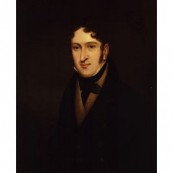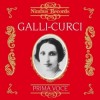Composers
Sir Henry Rowley Bishop (18 November 1786 – 30 April 1855) was an English composer. He is most famous for the songs "Home! Sweet Home!" and "Lo, Hear the Gentle Lark". He was the composer or arranger of some 120 dramatic works, including 80 operas, light operas, cantatas, and ballets. Knighted in 1842, he was the first musician to be so honoured. Bishop worked for all the major theatres of London in his era — including the Royal Opera House at Covent Garden, the Theatre Royal, Drury Lane, Vauxhall Gardens and the Haymarket Theatre, and was Professor of Music at the universities of Edinburgh and Oxford. His second wife was the noted soprano Anna Bishop, who scandalised British society by leaving him and conducting an open liaison with the harpist Nicolas-Charles Bochsa until the latter's death in Sydney.
Bishop was born in London, where his father was a watchmaker and haberdasher. At the age of 13, Bishop left full-time education and worked as a music-publisher with his cousin. After training as a jockey at Newmarket, he took some lessons in harmony from Francisco Bianchi in London. In 1804 he wrote the music to a piece called "Angelina", which was performed at Margate.
Bishop's "operas" were written in a style and format that satisfied the audiences of his day. They have more in common with the earlier, native English ballad opera genre, or with modern musicals, than the classical opera of continental Europe with full recitatives. His first opera, The Circassian's Bride (1809), had one performance at Drury Lane before the theatre burned down and the score was lost.
Between 1816 and 1828, Bishop composed the music for a series of Shakespearean operas staged by Frederic Reynolds. But these, and the numerous works, operas, burlettas, cantatas, incidental music etc. which he wrote are mostly forgotten. Even his limited partnering with various composers including Joseph Edwards Carpenter and Stephen Glover are overlooked. 1816 also saw the composition of a string quartet in C minor.[1]
His most successful operas were The Virgin of the Sun (1812), The Miller and his Men (1813), Guy Mannering (1816), and Clari, or the Maid of Milan (1823). Clari, with a libretto by the American John Howard Payne, included the song Home! Sweet Home!, which became enormously popular. In 1852 Bishop 'relaunched' the song as a parlour ballad. It was popular in the United States throughout the American Civil War and after. Also of note is Bishop's 1819 musical comedy adaptation of William Shakespeare's The Comedy of Errors, which included the popular coloratura soprano aria "Lo, Here the Gentle Lark".[2]
In 1825 Bishop was induced by Robert Elliston to transfer his services from Covent Garden to the rival house in Drury Lane, for which he wrote the opera Aladdin, based on the story from 1001 Nights. It was intended to compete with Weber's Oberon, commissioned by the other house. Aladdin failed, and Bishop's career as an operatic composer came to an end.
He did, however, rework operas by other composers. An 1827 Covent Garden playbill records a performance of the Marriage of Figaro with "The Overture and Music selected chiefly from Mozart’s operas – the new music by Mr Bishop". It included an aria called Follow, follow o’er the mountain, sung by Miss Paton.
Bishop was one of the original directors of the Philharmonic Society when it was founded in 1813. He conducted at Covent Garden and at the London Philharmonic concerts. In 1841 he was appointed Reid Professor of Music in the University of Edinburgh, but resigned the office in 1843. In 1848 he became Professor of Music at the University of Oxford, succeeding William Crotch. His last work was the commissioned music for the ode at the installation of Lord Derby as chancellor of the university in 1853.
According to William Denslow, Bishop was a free-mason. Bishop was knighted in 1842, the first musician to be so honoured.
Bishop's later years were clouded by scandal. He had married his second wife, the singer Ann Rivière, in 1831. She was twenty-three years younger than he and they had three children.[3] In 1839, Anna Bishop (as she was now known) abandoned her husband and three children to run off with her lover and accompanist, the harpist and composer Nicolas-Charles Bochsa. They left England to give concert tours abroad until Bochsa died in Sydney, Australia in 1856.[3] Anna Bishop sang in every continent and was the most widely travelled opera singer of the 19th century.
Sir Henry Bishop died in poverty in London, although he had a substantial income during his lifetime. He is buried in East Finchley Cemetery in north London.
Refine by search
view all| Country: | England |
| Period: | Romantique |
Biography
Sir Henry Rowley Bishop (18 November 1786 – 30 April 1855) was an English composer. He is most famous for the songs "Home! Sweet Home!" and "Lo, Hear the Gentle Lark". He was the composer or arranger of some 120 dramatic works, including 80 operas, light operas, cantatas, and ballets. Knighted in 1842, he was the first musician to be so honoured. Bishop worked for all the major theatres of London in his era — including the Royal Opera House at Covent Garden, the Theatre Royal, Drury Lane, Vauxhall Gardens and the Haymarket Theatre, and was Professor of Music at the universities of Edinburgh and Oxford. His second wife was the noted soprano Anna Bishop, who scandalised British society by leaving him and conducting an open liaison with the harpist Nicolas-Charles Bochsa until the latter's death in Sydney.
Bishop was born in London, where his father was a watchmaker and haberdasher. At the age of 13, Bishop left full-time education and worked as a music-publisher with his cousin. After training as a jockey at Newmarket, he took some lessons in harmony from Francisco Bianchi in London. In 1804 he wrote the music to a piece called "Angelina", which was performed at Margate.
Bishop's "operas" were written in a style and format that satisfied the audiences of his day. They have more in common with the earlier, native English ballad opera genre, or with modern musicals, than the classical opera of continental Europe with full recitatives. His first opera, The Circassian's Bride (1809), had one performance at Drury Lane before the theatre burned down and the score was lost.
Between 1816 and 1828, Bishop composed the music for a series of Shakespearean operas staged by Frederic Reynolds. But these, and the numerous works, operas, burlettas, cantatas, incidental music etc. which he wrote are mostly forgotten. Even his limited partnering with various composers including Joseph Edwards Carpenter and Stephen Glover are overlooked. 1816 also saw the composition of a string quartet in C minor.[1]
His most successful operas were The Virgin of the Sun (1812), The Miller and his Men (1813), Guy Mannering (1816), and Clari, or the Maid of Milan (1823). Clari, with a libretto by the American John Howard Payne, included the song Home! Sweet Home!, which became enormously popular. In 1852 Bishop 'relaunched' the song as a parlour ballad. It was popular in the United States throughout the American Civil War and after. Also of note is Bishop's 1819 musical comedy adaptation of William Shakespeare's The Comedy of Errors, which included the popular coloratura soprano aria "Lo, Here the Gentle Lark".[2]
In 1825 Bishop was induced by Robert Elliston to transfer his services from Covent Garden to the rival house in Drury Lane, for which he wrote the opera Aladdin, based on the story from 1001 Nights. It was intended to compete with Weber's Oberon, commissioned by the other house. Aladdin failed, and Bishop's career as an operatic composer came to an end.
He did, however, rework operas by other composers. An 1827 Covent Garden playbill records a performance of the Marriage of Figaro with "The Overture and Music selected chiefly from Mozart’s operas – the new music by Mr Bishop". It included an aria called Follow, follow o’er the mountain, sung by Miss Paton.
Bishop was one of the original directors of the Philharmonic Society when it was founded in 1813. He conducted at Covent Garden and at the London Philharmonic concerts. In 1841 he was appointed Reid Professor of Music in the University of Edinburgh, but resigned the office in 1843. In 1848 he became Professor of Music at the University of Oxford, succeeding William Crotch. His last work was the commissioned music for the ode at the installation of Lord Derby as chancellor of the university in 1853.
According to William Denslow, Bishop was a free-mason. Bishop was knighted in 1842, the first musician to be so honoured.
Bishop's later years were clouded by scandal. He had married his second wife, the singer Ann Rivière, in 1831. She was twenty-three years younger than he and they had three children.[3] In 1839, Anna Bishop (as she was now known) abandoned her husband and three children to run off with her lover and accompanist, the harpist and composer Nicolas-Charles Bochsa. They left England to give concert tours abroad until Bochsa died in Sydney, Australia in 1856.[3] Anna Bishop sang in every continent and was the most widely travelled opera singer of the 19th century.
Sir Henry Bishop died in poverty in London, although he had a substantial income during his lifetime. He is buried in East Finchley Cemetery in north London.



![Great Voices Of The Century - Sopranos, The Greatest Arias [CD2 of 4]](http://static.classicalm.com/repository/collection-cover/small/1402-img1403277217686408.jpg)
